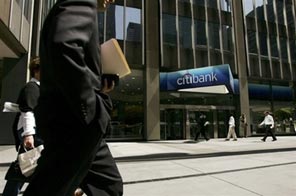US to enforce executive pay cuts
WASHINGTON: US President Barack Obama's administration will order cash salary cuts of 90 percent on average for top executives at firms that received significant government aid, newspapers reported Thursday.
Seven companies that received the most government assistance at the height of the US financial crisis will each be required to cut the salaries of their 25 best-paid executives.
The biggest cuts will be to the cash portions of the 175 employees' salaries, which will be slashed by an average of 90 percent, and will mostly fall below 500,000 dollars, the Wall Street Journal reported.
The salary restrictions come after domestic and international outrage over the huge bonuses being paid to employees of companies that received billions in government assistance and were widely blamed for helping to spark the financial crisis with irresponsible trading and business practices.
In the wake of widespread anger over the salaries being paid to employees of bailed out insurance giant American Insurance Group (AIG), Obama appointed Kenneth Weinberg his "salary czar" to tackle the issue.
Weinberg is now expected to unveil a set of measures limiting compensation packages for employees at the seven companies that received the biggest government bailouts -- AIG, Bank of America, Citigroup, General Motors Co., GMAC Inc., Chrysler Group LLC and Chrysler Financial.
For many of the 175 executives, the cash they would have received will be replaced by stock that will be restricted from immediate sale.
The New York Times reported that total compensation for the top earners, including stock and bonuses, will drop on average by about 50 percent under the plan to be announced in the next few days by the Treasury Department.
The Wall Street Journal said Weinberg would also demand a series of "corporate-governance" changes at the firms.
They included splitting the positions of chairman and chief executive officer and requiring boards of directors to create a committee to assess risk.
Some of the toughest pay restrictions will come at the financial-products unit of AIG, blamed for the insurance giant's near-collapse at the height of the crisis, the Journal said.
No employee within that unit will receive compensation of more than 200,000 dollars, it said, citing people familiar with the matter.
Leaders from the world's biggest economies pledged during a Group of 20 summit in Pittsburgh, Pennsylvania in September to tackle the issue of executive compensation in the financial sector, which many say played a role in encouraging reckless behavior by rewarding excessive risk-taking.
In a communique issued at the end of the summit, leaders pledged "to implement strong international compensation standards," but the impact of the executive salary cuts imposed by Weinberg was expected to be less significant than some had hoped because the average cuts are skewed by a few individual cases.
The Washington Post reported that among the cases used to calculate the average cuts was the 100 million dollar bonus that Citigroup intended to pay star trader Andrew Hall.
Ultimately, Citigroup opted to sell Hall's unit to another company and defer his payment until 2010, when it will not come under Feinberg's mandate, meaning his 2009 bonus is listed as zero.
Another case that may skew the average is the salary that Bank of America's outgoing Chief Executive Ken Lewis has agreed to forfeit. He will still be paid 70 million dollars in retirement money by the bank, which received 45 billion in government aid.
The Post said Weinberg will also seek to curtail some of the most extravagant corporate perks offered to executives, including the use of corporate jets for personal travel, drivers and reimbursement for country club membership.






